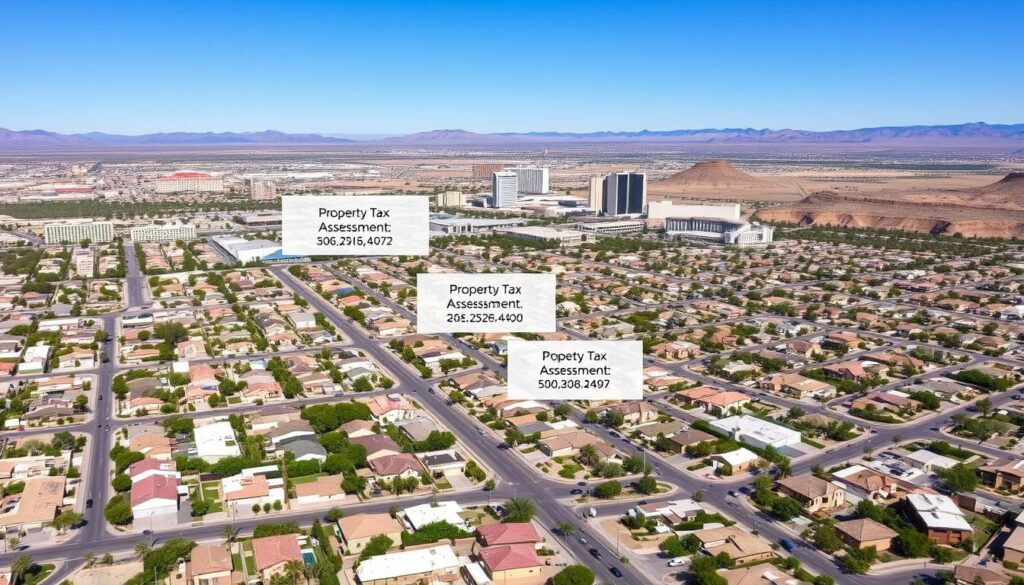As a homeowner or potential buyer in Las Vegas, it’s essential to grasp the basics of how property taxes work in Nevada. With the expertise of Las Vegas REALTOR Marissa H Marshall, we’ll delve into the world of Las Vegas property taxes, exploring how they’re calculated and the benefits of tax caps and abatements. Las Vegas property taxes are approximately 1% of the home’s value, making the city attractive to property investors and homebuyers. The median property tax rate in Las Vegas, NV is 0.74%, lower than the national median of 0.99% and the Nevada state median of 0.80%.
Work with Las Vegas REALTOR Marissa H Marshall to navigate the complex world of real estate taxes Las Vegas. The population in Clark County as of 2022 is 2.23 million, and with 112 tax districts, it’s crucial to understand how property taxes are calculated based on the tax assessed value. The assessed value in Las Vegas helps calculate property taxes by multiplying it by the combined tax rates of all relevant taxing entities.
Las Vegas property taxes are generally lower than the national average, making the city an attractive destination for property investors and homebuyers. The Clark County Treasurer collects property taxes in Las Vegas and sends out tax bills to property addresses. Homeowners are legally required to pay property taxes even if they do not receive the bill.
Key Takeaways
- Las Vegas property taxes are approximately 1% of the home’s value.
- The median property tax rate in Las Vegas, NV is 0.74%, lower than the national median of 0.99% and the Nevada state median of 0.80%.
- Work with Las Vegas REALTOR Marissa H Marshall to navigate the complex world of real estate taxes Las Vegas.
- The assessed value in Las Vegas helps calculate property taxes by multiplying it by the combined tax rates of all relevant taxing entities.
- Las Vegas property taxes are generally lower than the national average, making the city attractive to property investors and homebuyers.
- The Clark County Assessor’s Office provides detailed information on specific properties, tax districts, tax abatements, and taxable property values.
- Understanding Las Vegas property taxes is crucial for making informed decisions about your real estate investments.
Las Vegas Property Taxes: Current Rates and Recent Changes
As we delve into the world of property tax rates in Las Vegas, it’s essential to understand the current landscape and recent changes that may impact your tax bill. The general property tax rate in Las Vegas is 3.2782%, and the effective property tax rate is 0.48%, which is lower than the national average. This information is crucial for homeowners and real estate investors looking to make informed decisions about their properties, considering the property tax rates Las Vegas and their implications.
We’ve seen significant changes in the Las Vegas real estate market, with the median home value increasing by 17% above the national average in 2023. The effective property tax rate for median-valued homes in Las Vegas is 12% below the national average. To break it down further, here are some key points to consider:
- Property tax rates in Las Vegas range between 0.5% and 0.75% annually.
- Property taxes in Las Vegas can increase a maximum of 3% regardless of the home’s appraised value.
- The tax implications for homeowners Las Vegas are significant, with the city’s property tax system not favoring homeowners over commercial property owners.
It’s also worth noting that Nevada implemented property assessment caps in 2005 to control rapidly rising land and home values. The Lincoln Institute report suggests that property tax caps can create inequities among homeowners based on how long they have owned their homes. As we consider the tax implications for homeowners Las Vegas, it’s essential to stay up-to-date on the latest changes and regulations.
By understanding the current property tax rates and recent changes in Las Vegas, homeowners and investors can make informed decisions about their properties and plan accordingly. Whether you’re looking to buy, sell, or invest in the Las Vegas real estate market, it’s crucial to consider the property tax rates Las Vegas and their impact on your bottom line.
How Property Tax Assessments Work in Clark County
In Clark County, property tax assessments are determined by the Assessor’s office, which uses the cost method to calculate the taxable value of properties. This involves calculating the replacement cost of the property, minus depreciation, and adding the market value of the land. To ensure your property is assessed fairly and accurately, it’s essential to understand how property tax assessments work. We can help you navigate the process and provide tips on how to ensure your property is valued correctly.
For example, if you’re a homeowner in Las Vegas, you’ll want to know how real estate taxes Las Vegas are calculated. The taxable value is determined by the Assessor using the cost method, with a 1.5% annual depreciation factor up to a maximum of 50 years. Property values are updated annually, and land values are derived from market sales or recognized appraisal methods.
Here are some key points to consider when it comes to property tax assessments in Clark County:
- Tax rates in various tax districts are determined by the Department of Taxation.
- Properties that qualify for a tax abatement have taxes calculated based on the assessed value or applying the appropriate tax cap percentage.
- A property’s value may increase, causing taxes to go up due to the Assessor’s annual reevaluation based on current value of improvements and land.
Understanding how property tax assessments work can help you make informed decisions about your real estate taxes Las Vegas. If you have questions or concerns about your property tax assessment, don’t hesitate to reach out to us for guidance. We’re here to help you navigate the process and ensure you’re not overpaying on your property tax assessments.

Important Exemptions and Tax Benefits for Las Vegas Homeowners
As a homeowner in Las Vegas, it’s essential to understand the various tax implications for homeowners Las Vegas and take advantage of available exemptions and tax benefits to reduce your tax bill. Nevada offers several exemptions, including primary residence exemptions, senior citizen benefits, and veteran and disability exemptions.
For example, veterans may be eligible for an exemption of up to $34,400 in assessed value, depending on their level of disability. The assessed value for a 100% Disabled Veteran exemption is $34,400. Additionally, surviving spouses and blind individuals may also be eligible for exemptions, with assessed values ranging from $1,720 to $8,600.
Here is a summary of some of the exemptions available in Nevada:
| Exemption Type | Assessed Value |
|---|---|
| Veteran Exemption | $3,440 |
| 60%-79% Disabled Veteran Exemption | $17,200 |
| 80%-99% Disabled Veteran Exemption | $25,800 |
| 100% Disabled Veteran Exemption | $34,400 |
By understanding and taking advantage of these property tax exemptions, homeowners in Las Vegas can significantly reduce their tax liability and keep more of their hard-earned money. We encourage you to explore these options and consult with a tax professional to determine which exemptions you may be eligible for.
Understanding Your Tax Bill and Payment Options
Receiving your tax bill can be a daunting experience, especially if you’re not sure what you’re looking at or how to pay it. We’re here to help you understand the different components of your tax bill and discuss the various payment options available to you. The Clark County Treasurer’s office is responsible for collecting property tax payments Las Vegas, and they offer several payment options, including online payments, phone payments, mail-in payments, in-person payments, and utilizing a kiosk for payment at the Clark County Government Center.
Some key things to note about property tax payments Las Vegas include:
- Service fees are charged for debit or credit card payments made online or over the phone.
- In-person payments at the County Treasurer’s office accept cash, checks, and debit cards without any additional fees.
- E-check payments are accepted without a fee via online, kiosk, or mail-in payment methods.
It’s essential to pay your tax bill on time to avoid penalties and late fees. The County Treasurer’s office is open from 7:30 a.m. to 5:30 p.m. Monday through Thursday, except for holidays. A drop box is also available at the County Government Center for check or money order payments. Remember, only one real property tax bill is sent out each fiscal year, and it must be paid within 10 days of the due date to avoid penalties.

By understanding your tax bill and payment options, you can ensure you’re in compliance with the law and avoid any unnecessary fines or penalties. We’re committed to helping you navigate the process of property tax payments Las Vegas and providing you with the guidance you need to make informed decisions about your tax bill.
Property Tax Appeals and Assessment Challenges
As a property owner in Las Vegas, it’s essential to understand your rights and options for appealing your property tax assessment. If you disagree with your assessment, you can appeal it to the County Board of Equalization or the State Board of Equalization. The deadline to file an appeal is typically within a specific timeframe, such as January 15, after receiving the “Notice of Assessment” from the county assessor.
The grounds for appeal may include errors in the assessment, such as incorrect property valuation or miscalculation of the taxable value. To support your appeal, you’ll need to provide documentation, including evidence of the property’s value, such as comparative market analysis or appraisal reports. You can find more information on the appeal process and required documentation on the website of the Nevada Tax Commission.
The timeline and deadlines for filing an appeal are crucial to ensure your case is heard. The county board of equalization hearings in Las Vegas must conclude by the end of February, and the State Board of Equalization responds to appeals through specific forms, such as the Taxpayer Appeal From CBE Form and Taxpayer Direct Appeal Form. It’s essential to note that failure to file the Petition for Re-determination timely may result in the determination becoming final.
- Review your property tax assessment and identify any errors or discrepancies
- Gather evidence to support your appeal, including documentation of the property’s value
- File your appeal within the specified deadline, typically within 30 days of the Administrative Law Judge’s decision
- Prepare for the evidentiary hearing, which may be scheduled in Las Vegas, Carson City, or Reno
By understanding the property tax appeals process and assessment challenges in Las Vegas, you can ensure you’re not overpaying on your taxes and that your property is assessed fairly and accurately. Remember to stay informed and seek professional guidance if needed to navigate the complex process of property tax appeals Las Vegas and assessment challenges.
| Deadline | Description |
|---|---|
| January 15 | Deadline to decide whether to contest the taxable value of your property |
| End of February | County board of equalization hearings in Las Vegas must conclude |
| 30 days | Deadline to file an appeal to the Nevada Tax Commission |
Conclusion: Making Informed Decisions About Las Vegas Property Taxes
As you explore the dynamic Las Vegas housing market, understanding the impact of property taxes is crucial for making informed decisions. With Nevada boasting one of the lowest property tax rates in the United States, at an average effective rate of 0.48%, the overall affordability of Las Vegas real estate becomes even more compelling.
By collaborating with experienced REALTOR Marissa H Marshall, you can navigate the complexities of Las Vegas property taxes and ensure you’re not overpaying on your investment. From navigating the nuances of tax assessments and exemptions to understanding the benefits of tax abatements, Marissa’s expertise can empower you to make strategic decisions that align with your financial goals.
Remember, knowledge is power when it comes to real estate investments. By staying informed about the latest trends and regulations surrounding real estate taxes in Las Vegas, you can maximize the potential of your properties and achieve long-term success in this thriving market.


